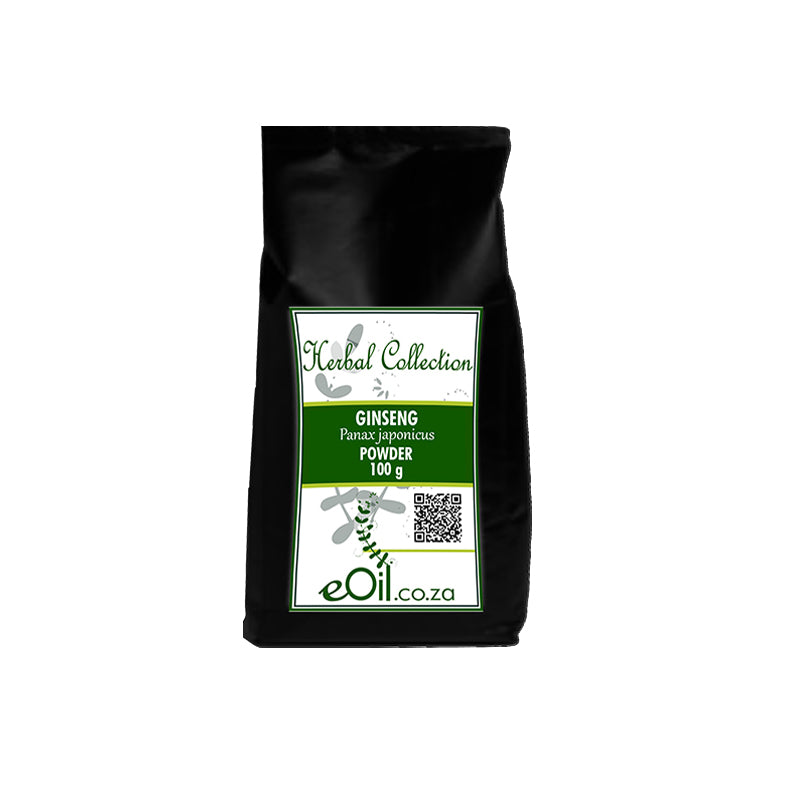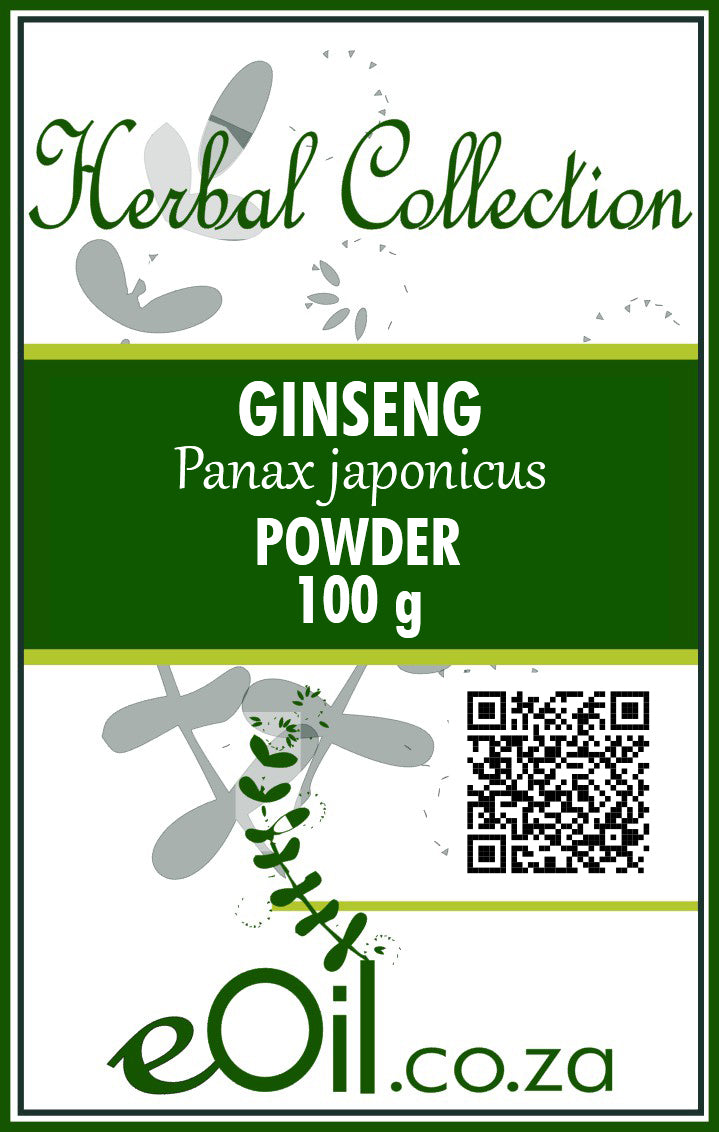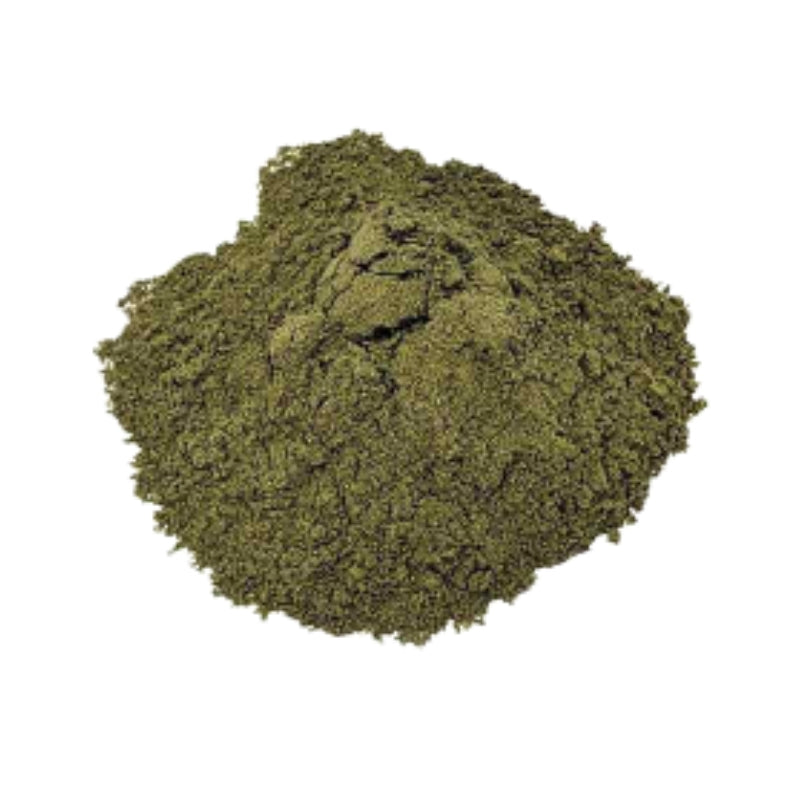Ginseng Powder (Panax Japonicus) - Herbal Collection
Ginseng Powder (Panax Japonicus) - Herbal Collection is backordered and will ship as soon as it is back in stock.
Description
Description
Ginseng Powder (Panax Japonicus) is a pure botanical supplement, traditionally valued as an adaptogen for promoting natural vitality, focus, and stamina.
Rich in ginsenosides and phytonutrients, this powder supports overall wellness and balance. Ideal for daily energy, wellness blends, or smoothies.
Free from additives and suitable for plant-based diets.
Understanding Ginseng Varieties: Korean, Japonicus, Alba, and Panax Ginseng
Understanding Ginseng Varieties: Korean, Japonicus, Alba, and Panax Ginseng
Ginseng is a term that refers to several species within the genus Panax. While these species share some similarities, they differ in origin, processing, and herbal properties. Here’s a breakdown of the main types mentioned in your query:
1. Panax Ginseng (Korean Ginseng)
- Scientific Name: Panax ginseng C.A. Meyer
- Also Known As: Korean ginseng, Asian ginseng, Chinese ginseng, Red ginseng, White ginseng
- Origin: Native to Korea, China, and parts of Siberia.
- Properties: Highly valued in traditional medicine for its adaptogenic effects—helping the body resist stress, improve energy, enhance cognitive function, support immunity, and regulate blood sugar. The main active compounds are ginsenosides, which have anti-inflammatory, antioxidant, and metabolic benefits.
- Processing:
- Red Ginseng: Steamed and dried, considered more potent.
- White Ginseng (Alba): Peeled and sun-dried without steaming, typically milder in effect.
2. Panax Japonicus (Japanese Ginseng)
- Scientific Name: Panax japonicus
- Origin: Native to Japan and parts of China.
- Properties: Shares similar adaptogenic and tonic properties with Panax ginseng, but may have a slightly different ginsenoside profile. Used in East Asian herbal medicine for fatigue, immune support, and general well-being. It is less commonly used globally compared to Korean ginseng.
3. Alba (White Ginseng)
- Definition: "Alba" refers to the white, dried form of ginseng root, not a separate species. Both Panax ginseng and Panax japonicus can be processed into "alba" (white) ginseng.
- Processing: Achieved by peeling and sun-drying the root, which preserves more of the original compounds compared to red ginseng (which is steamed).
- Properties: Generally milder in effect than red ginseng but retains the core adaptogenic and tonic benefits.
4. Comparison Table
| Name | Species | Origin | Processing (Alba/Red) | Main Properties |
|---|---|---|---|---|
| Korean Ginseng | Panax ginseng | Korea/China | Alba (white), Red | Adaptogen, energy, cognitive, immune |
| Panax Japonicus | Panax japonicus | Japan/China | Alba (white) | Similar to Panax ginseng, less studied |
| Ginseng Alba | Any Panax species | - | White (sun-dried) | Milder, adaptogenic, tonic |
| Panax Ginseng | Panax ginseng | Korea/China | Alba (white), Red | See Korean Ginseng |
5. Key Herbal Differences
- Species: Panax ginseng (Korean/Asian ginseng) is the most researched and widely used. Panax japonicus is a related but distinct species, used mainly in Japanese and Chinese herbalism.
- Processing: "Alba" means white ginseng, which is simply sun-dried and peeled root. Both Panax ginseng and Panax japonicus can be processed into alba.
- Properties: All true Panax species are considered adaptogens, but subtle differences exist in their ginsenoside content and traditional uses. Korean ginseng (especially red) is generally considered the most stimulating and potent, while alba (white) forms are milder.
6. Summary
- Same or Different?
- Panax ginseng (Korean ginseng) and Panax japonicus (Japanese ginseng) are different species within the Panax genus.
- "Alba" refers to the white, dried form of the root, not a species.
- All are used for similar adaptogenic and tonic purposes in herbalism, but with some differences in potency and tradition.
- Herbal Properties:
- All Panax species share adaptogenic, immune-supporting, and energy-boosting properties, but Korean ginseng (especially red) is considered the most potent and stimulating, while white (alba) forms are milder and more suitable for sensitive individuals
The color of Panax japonicus (Japanese ginseng) powder can vary, but both greenish and yellowish hues are possible and normal, depending on several factors such as:
- Harvest time and freshness of the root
- Processing method (e.g., dried in the shade vs. sun, ground with skin or peeled)
- Storage conditions
- Presence of natural chlorophyll or residual plant material
Most images online show a yellowish or beige powder, which is typical for Panax species that have been well-dried and fully matured before grinding. However, a greenish tint is also seen, especially if the powder was ground from fresher roots or includes more of the outer skin or "rind" of the root. This is not a sign of adulteration or low quality, but rather a result of natural batch variation in Panax japonicus.
- Yellowish-beige powder: Most commercial ginseng powders, especially those heavily processed, appear this color.
- Greenish powder: Sometimes seen in artisan, small-batch, or less processed Panax japonicus powders. This can happen if the root is dried less aggressively or finely milled with more root skin.
TRADITIONALLY USED FOR
Panax Ginseng – Powder, Vegan Capsules, and Extracts
What is Panax Ginseng?
Panax ginseng (Asian/Korean ginseng) is a celebrated root with a centuries-long history in Chinese and Korean medicine as a powerful adaptogen and tonic. Its main actives are ginsenosides, a diverse group of bioactive saponins. It comes as powder, vegan capsules, and standardized extracts.
Panax Ginseng Powder
Description:
- Panax Japonicus/Panax ginseng root, dried and ground1.
- Traditionally used as a restorative, adaptogen, and overall health tonic.
Benefits:
- Adaptogenic: Supports adaptation to stress, both physical and mental.
- Cognitive support: May improve focus, memory, and alertness.
- Stamina/Energy: Traditional use to boost endurance, vitality, and recovery from fatigue.
- Immunity: Modulates immune system—may enhance resistance to infection.
- Anti-inflammatory/Antioxidant: Ginsenosides support natural anti-inflammatory and antioxidant effects.
- Metabolic/Wellness: Some evidence for healthy blood sugar and cardiovascular support.
How to Use:
- 500–1000 mg (1/4–1/2 tsp) daily, in water, smoothie, or juice, or per label.
- Add to wellness drinks or energy blends.
Panax Ginseng Vegan Capsules
Description:
- Pure ginseng extract (root, standardized to ginsenosides), in vegan hypromellose capsules.
- Often 200–500 mg per cap; check product for % ginsenosides (marker of potency).
Benefits:
- Daily adaptogenic support: Promote resilience, mental clarity, and steady energy.
- Immunity & Inflammation: Supports immune modulation and inflammatory balance.
- Men’s & Women’s Vitality: Sometimes included in well-being or libido blends.
- Muscle Recovery/Endurance: Popular pre- and post-workout tonic.
How to Use:
- 1–2 capsules daily, or per label (often 500–1000 mg ginseng extract total).
- Take with food/water in the morning or before exercise.
Panax Ginseng Extracts (Tinctures/Glycerites)
Description:
- Concentrated extracts (usually alcohol, or glycerite for alcohol-free), standardized to ginsenosides.
- Used for rapid absorption and dose flexibility.
Benefits:
- Fast adaptogenic effect, stress support, fatigue and cognitive boost.
- Immune modulating, antioxidant benefits.
- Potential for metabolic, blood sugar and cardiovascular wellness—studies ongoing.
How to Use:
- Dose varies; often 10–30 drops (0.5–1 ml) 1–3 times daily in water/juice/tea, as per product label.
General Safety, Efficacy & Precautions
- Short-term oral use (up to 6 months) considered safe in healthy adults.
- Possible mild side effects: Insomnia, restlessness, headache, GI upset, rare allergic reactions or rash.
- Long-term or very high doses: May affect hormones; avoid >6 months continuous high-dose use without supervision.
- Pregnancy/Breastfeeding: Not recommended due to lack of safety data and possible hormone-like activity.
- Children: Not recommended.
- Interactions: May interact with blood thinners, diabetes medications, stimulants, and other herbal supplements—consult a healthcare provider.
| Feature | Preferred Standard |
|---|---|
| Source | Panax ginseng root (Korean, Chinese, Japanese/Panax Japonicus) |
| Active Compound | Ginsenosides (% on label, batch COA) |
| Forms | Powder, vegan capsules, alcohol/glycerite extract |
| Use | Daily adaptogen, wellness, energy, immunity |
| Typical Dose | Powder: 500–1000 mg; Capsules: 1–2 x 400–500 mg; Extract: per label |
| Safety | Short-term safe in most adults; monitor for side effects |
| Certification | Vegan, food grade, lab-tested, non-GMO |
Panax ginseng is a food supplement, not a medicine. Always consult your healthcare provider before starting new adaptogenic regimens, especially if using medications or managing chronic conditions.
INFORMATION
Source : http://www.wikiphyto.org/wiki/Garcinia
Reference on http://www.wikiphyto.org
Translation in English by Google Translate (go to the page of the source linked | on Chrome cellphones go on the 3 dots on the top right and select translate in your preferred language | on laptop right click your mouse and select option translate when hoovering on the page
plant name
Garcinia, Cambogia , Malabar tamarind , or guttier
International Latin denomination
Garcinia gummi-gutta (L.) N.Robson, Garcinia cambogia Desr., Cambogia gummi-gutta L., Mangostana cambogia Gaertn. [1] , Garcinia cambodia
botanical family
Clusiaceae
Description and habitat
- Shrubby plant from Southeast Asia, simple and opposite leaves, shiny dark green, yellow fruit, red when ripe, with 6 to 8 furrows, which looks like a very small pumpkin (approximately 5 cm in diameter)
History and tradition
- Garcinia mangostana is Mangosteen , whose pulp is used as a substitute for butter
- Garcinia morella and Garcinia hanburgi provide Gamboge , a violent purgative which is no longer used and coloring matter for paints
Parts used
- fruit pericarp
Dosage forms available
- Dry extract, drink, chewing gum, tablet
Usual dosages
- 2 capsules dosed at 400 mg of dry extract, 1/2 hour before meals
Composition
Main components of the plant
- Fruit acid: hydroxycitric acid (30%)
Main components of buds or young shoots
Main components of essential oil
Properties
Plant properties
- Regulating agent of obesity [6]
- Decreases fatty acid synthesis, increases lipid oxidation
- Antioxidant and anti-inflammatory [9]
- Protection against metabolic syndrome, renal protection against oxidative stress [10]
- Antidiabetic, protection against hepatic toxicity induced by hyperglycemia in rats, by decreasing the inflammatory response [11]
- Hypocholesterolemic [12]
- Decrease appetite
- Immunomodulating [13]
- The gambogic acid present in various Garcinia possesses a synergistic effect with docetaxel on apoptosis, in gastric and colon cancers [14]
Bud properties
Properties of essential oil
Directions
Indications of the whole plant (phytotherapy)
- Obesity, but studies are disappointing [15] , [16]
- Adjuvant to hypocaloric diets
- Diabetes
- Hypercholesterolemia
Indications of the bud (gemmotherapy)
Specific indications of essential oil (aromatherapy)
Known or suspected mode of action
- Hydroxycitric acid is a “fruit acid” derived from citric acid
- It would block the transformation of preadipocytes into adipocytes [17]
- Hydroxycitric acid inhibits the enzyme ATP-dependent citrate lyase, which catalyzes the cleavage of citric acid into oxaloacetic acid and acetyl-CoA [18]
- The fruit of Garcinia cambogia contains calcium hydroxycitrate and hydroxycitric acid , The hypothesis of a possible anti-cancer effect results from the selective inhibition of citrate lyase, which would block the production of citric acid and the functioning of the Krebs cycle of tumor cells
Usual formulations
Regulations
- Garcinia cambogia is prohibited in weight-loss preparations made in pharmacies (ANSM press release of May 10, 2012). The decision published in the Official Journal (OJ) of June 10, 2012, extends the ban to homeopathic preparations, prescription and import
- The gum-resin of guttier ( Garcinia cambogia ) appears in the Belgian royal decree of March 19, 2012 (modifying the royal decree of August 29, 1997) relating to foodstuffs containing plants.
- In the EFSA Compendium, the whole plant ( Garcinia gummi-gutta ) is concerned to have a negative impact on health due to the presence of HCA or hydroxy-citric acid
Possible side effects and precautions for use
- Good safety of use up to a dose of 3000 mg/day of extract [19]
- High dose testicular toxicity [20]
- Liver toxicity (risk of fulminant hepatitis at high doses) [21]
- Rhabdomyolysis has been described following the consumption of American products based on Garcinia cambogia , the exact composition of which was not known.
Bibliographic references
- Go↑ GRIN Taxonomy for Plants
- Go↑ Aisha AF, Abu-Salah KM, Ismail Z, Abdul Majid A. In vitro and in vivo anti-colon cancer effects of Garcinia mangostana xanthones extract. BMC Complementary and Alternative Medicine 2012, 12:104 (20 July 2012) Abstract , full text
- Go↑ Tsai SY, Chung PC, Owaga EE, Tsai IJ, Wang PY, Tsai JI, Yeh TS, Hsieh RH. Alpha-mangostin from mangosteen (Garcinia mangostana Linn.) pericarp extract reduces high fat-diet induced hepatic steatosis in rats by regulating mitochondria function and apoptosis. Nutr Metab (London). 2016 Dec 1;13:88. eCollection 2016. PMID 27980597
- Go↑ Yukihiro Akao, Yoshihito Nakagawa, Munekazu Iinuma, Yoshinori Nozawa. Anti-Cancer Effects of Xanthones from Pericarps of Mangosteen. Int J Mol Sci. 2008 March; 9(3): 355–370. Published online 2008 March 14. PMCID: PMC2635669 full text
- Go↑ Shibata MA, Iinuma M, Morimoto J, Kurose H, Akamatsu K, Okuno Y, Akao Y, Otsuki Y. α-Mangostin extracted from the pericarp of the mangosteen (Garcinia mangostana Linn) reduces tumor growth and lymph node metastasis in an immunocompetent xenograft model of metastatic mammary cancer carrying a p53 mutation. BMC Med. 2011 Jun 3;9:69. doi: 10.1186/1741-7015-9-69. Full Text
- Go↑ R. Revathi, R. Ravi, VS Saravanan, T. Ethiraj, T. Sudhamani. Isolation and characterization of (-) hydroxy citric acid from Garcinia cambogia fruit extract. International journal of pharmaceutical research and development, September 2010, Volume 2, Issue 7 [1]
- Go↑ Shara M, Ohia SE, Yasmin T, Zardetto-Smith A, Kincaid A, Bagchi M, Chatterjee A, Bagchi D, Stohs SJ. Dose- and time-dependent effects of a novel (-)-hydroxycitric acid extract on body weight, hepatic and testicular lipid peroxidation, DNA fragmentation and histopathological data over a period of 90 days. Mol Cell Biochem. 2003 Dec;254(1-2):339-46. PMID 14674714
- Go↑ Preuss HG, Rao CV, Garis R, Bramble JD, Ohia SE, Bagchi M, Bagchi D. An overview of the safety and efficacy of a novel, natural(-)-hydroxycitric acid extract (HCA-SX) for weight management. J Med. 2004;35(1-6):33-48. PMID 18084863
- Go↑ Xie Z, Sintara M, Chang T, Ou B. Daily consumption of a mangosteen-based drink improves in vivo antioxidant and anti-inflammatory biomarkers in healthy adults: a randomized, double-blind, placebo-controlled clinical trial. Food Science & Nutrition. 2015;3(4):342-348. doi:10.1002/fsn3.225. Full Text
- Go↑ Amin KA, Kamel HH, Abd Eltawab MA. Protective effect of Garcinia against renal oxidative stress and biomarkers induced by high fat and sucrose diet. Lipids Health Dis. 2011 Jan 14;10:6. PMID 21235803 Full text: [2]
- Go↑ Ayepola OR, Chegou NN, Brooks NL, Oguntibeju OO. Kolaviron, a Garcinia biflavonoid complex ameliorates hyperglycemia-mediated hepatic injury in rats via suppression of inflammatory responses. BMC Complementary and Alternative Medicine 2013, 13:363 (20 December 2013) abstract full text
- Go↑ Sarah Koshy, Asha & Anila, L & Vijayalakshmi, Narayana. (2001). Flavonoids from Garcinia cambogia lower lipid levels in hypercholesterolemic rats. Food Chemistry. 72. 289-294. 10.1016/S0308-8146(00)00225-9.
- Go↑ Tang YP, Li PG, Kondo M, Ji HP, Kou Y, Ou B. Effect of a mangosteen dietary supplement on human immune function: a randomized, double-blind, placebo-controlled trial. J Med Food. 2009 Aug;12(4):755-63. doi: 10.1089/jmf.2008.0204. PMID 19697997
- Go↑ Zou Z, Xie L, Wei J, Yu L, Qian X, Chen J, Wang T, Liu B. Synergistic anti-proliferative effects of gambogic acid with docetaxel in gastrointestinal cancer cell lines. BMC Complementary and Alternative Medicine 2012, 12:58 (30 April 2012) abstract [3] , Full text: [4]
- Go↑ Heymsfield SB, Allison DB, Vasselli JR, Pietrobelli A, Greenfield D, Nunez C. Garcinia cambogia (hydroxycitric acid) as a potential antiobesity agent: a randomized controlled trial. JAMA. 1998 Nov 11;280(18):1596-600. PMID 9820262
- Go↑ Vasques CA, Rossetto S, Halmenschlager G, Linden R, Heckler E, Fernandez MS, Alonso JL. Evaluation of the pharmacotherapeutic efficacy of Garcinia cambogia plus Amorphophallus konjac for the treatment of obesity. Phytother Res. 2008 Sep;22(9):1135-40. PMID 18729243
- Go↑ Chaumont JP, Millet-Clerc J. Phyto-aromatherapy applied to dermatology. Tec & Doc Lavoisier, 2011
- Go↑ Márquez F, Babio N, Bulló M, Salas-Salvadó J. Evaluation of the safety and efficacy of hydroxycitric acid or Garcinia cambogia extracts in humans. Crit Rev Food Sci Nutr. 2012;52(7):585-94. PMID 22530711
- Go↑ Yuri Ishii, Izuru Kaneko, Manzhen Shen, Kohsuke Hayamizu, Norihiro Shigematsu, Hironori Tomi, Gen Yoshino, Hiroyuki Shimasaki. Safety of Garcinia cambogia Extract in Healthy Volunteers: High-Dose Administration Study IIJournal of Oleo Science, Vol. 52 (2003), No. 12 663-671. [5]
- Go↑ Saito M, Ueno M, Ogino S, Kubo K, Nagata J, Takeuchi M. High dose of Garcinia cambogia is effective in suppressing fat accumulation in developing male Zucker obese rats, but highly toxic to the testis.Food Chem Toxicol. 2005 Mar;43(3):411-9. PMID 15680676
- Go↑ Lunsford KE, Bodzin AS, Reino DC, Wang HL, Busuttil RW. Dangerous dietary supplements: Garcinia cambogia-associated hepatic failure requiring transplantation. World J Gastroenterol. 2016 Dec 7;22(45):10071-10076. doi: 10.3748/wjg.v22.i45.10071. PMID 28018115
- Mahnaz Kazemipoor, Che Wan Jasimah Wan Mohamed Radzi, Geoffrey A. Cordell, Iman Yaze. Potential of Traditional Medicinal Plants for Treating Obesity: A Review. 2012 International Conference on Nutrition and Food Sciences IPCBEE vol. 39 (2012) IACSIT Press, Singapore [6]
- Decision of April 12, 2012, Ministry of Social Affairs and Health, JORF June 10, 2012;
- ANSM press release, 10 May 2012
CAUTION
Store in a cool, dry place, away from light. Keep tightly closed, away from the reach of Children and pets.
Do not exceed the daily dose.
This product is not intended to prevent or cure any form of illness or disease.
If you are pregnant or nursing ; If you have a medical condition or are in the course of medical treatment ; If you are programmed for theater/operation in the near future, please consult your healthcare practitioner before using this product.
This product cannot replace a varied and balanced diet and a healthy lifestyle.
This product has not been evaluated by the SAHPRA for its quality, safety or intended use.
For More Information please check our General Safety Herbal products Page

Ginseng Powder (Panax Japonicus) - Herbal Collection is backordered and will ship as soon as it is back in stock.







